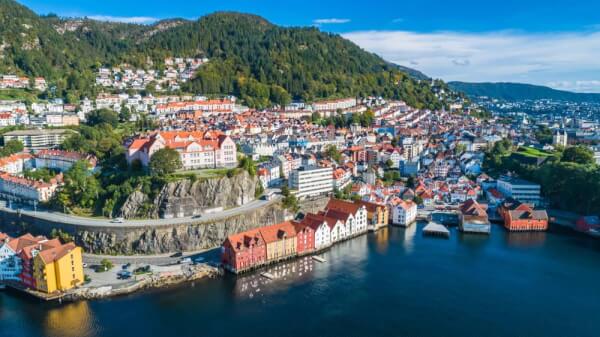How to order from Amazon in Norway
Planning a visit to the land of fjords and Northern Lights, or perhaps you're already a resident of Norway? Whether you're an expat or a local, thinking about...

Norway is a fantastic destination if you’re an expat looking to live and work abroad somewhere with friendly people, an interesting heritage, and awesome nature. Maybe you’re thinking of heading there for part of a working gap year, or you want to settle permanently to give your career a boost.
Life in Norway is notoriously expensive. But in general, salaries are on the high side, too - especially in niche jobs and in the oil and gas sectors. Whatever you’re thinking of doing for money while you’re there, it’s important to understand the likely wage you can earn - and of course how that balances with the cost of living.
This guide tells you all you need to know about how minimum wage levels are set in Norway, how they compare to the costs of living there and minimum wages elsewhere in the world.
Technically there is no minimum wage in Norway. However, there are collective agreements across some sectors which are legally enforced - which means that in effect, there are minimum wages in some, low-income industries and jobs. This approach offers a degree of protection for workers, to make sure that they’re paid fairly for the work they do.
Not all sectors are covered, but these industries do have a collective agreement on minimum wage:
If you don’t work in one of these sectors, then there is no minimum wage set out in law. You have to agree to the salary you’ll earn directly with your employer.
The minimum wage set varies according to the sector and the type of role. There are also different provisions for shift work, unsociable hours, and so on. Here’s a rundown of the basic minimums:
| Industry | Minimum hourly wage |
|---|---|
| Construction | Construction site workers
|
| Agriculture and horticulture | Seasonal workers:
|
| Cleaning |
|
| Fish processing |
|
| Electricians |
|
| Freight transport by road |
|
| Passenger transport by tour bus |
|
| Hotel, Restaurant and Catering |
|
The minimum wages are set by collective agreement. This is a process by which trade unions and company representatives negotiate and come to agreements which are then applied to the whole workforce. Collective agreements cover lots of aspects of working life in Norway, with some 70% of workers having aspects of their terms and conditions set by collective agreement.
Collective agreements can be done on a broad, industry level, and by individual companies. In the case of the minimum wage agreements, these are made by the industry, and then become legally binding. That means that all of the companies operating in the sector must abide by these rules.
This is set on an industry level, as described in the table above. In some industries, there is a different wage offered to younger workers under the age of 18 - at least for the first few weeks of work.
When you’re working out the practicalities of living in Norway, it's important to take into consideration the cost of living in Norway. The price of rent and regular daily costs can vary largely depending on location. Often you’ll find that the places with the best salaries on offer also come with the highest price tags - Oslo, for example, has been rated the world’s most expensive place to live on several scales.
That said, even the lowest paid job in Norway will net you more than double the federal minimum wage in America. Play your cards right and you could earn significantly more than that - and the good news is that in general, people in Norway rate their quality of life highly, according to the OECD.
Exactly what quality of life you can afford will depend a lot on what you like to do, and the place you choose to live. City life is more costly than living somewhere more rural for example - and although there are plenty of expensive cultural activities on offer, there are also lots of ways to keep busy entirely for free, like getting out into nature.
Wherever you’re headed to, life in Norway won’t be cheap, and so it’s worth taking some practical steps to make sure your money goes further. One common expat challenge is the cost of converting your cash to different currencies when you’re abroad.
When you need to change money, the fees and charges applied to your conversion can quickly mount up. But what some travellers don’t realise is that the exchange rate used is just as important, when it comes to making sure you don’t get ripped off. If your bank or exchange service says that they offer currency exchange with low or no fees, be wary. You can be sure that they still have to make a profit. In this case, instead of listing a transparent fee, they mark up the exchange rate and take the difference as their profit.
It’s easy to check if your bank is giving you a good rate with an online currency converter. Just compare the difference between the real exchange rate for the day, and the one they’re offering you.
Before you settle for using your regular bank, check out what you’d end up with if you do your currency conversion with Wise. You could find you get a better deal because Wise uses the real exchange rate - the one you’ll find on Google - and applies only a low, upfront fee for transfers.
With Transferwise, you can transfer your money electronically to an account held in another currency with only a fair, transparent fee. It usually works out cheaper than traditional services, because while most money transfer services have high charges for international transfers using the SWIFT system, Wise does things differently than banks. By avoiding the costs of using that system, Wise can pass on the savings to customers.
If you need to move your money between different currencies frequently, a borderless multi-currency account could save you money, and make your life much easier.
You can keep your cash in any one of dozens of different currencies, check your balance at a glance, and switch between currencies when you need to, with the real exchange rate, and a low fee. It’s perfect for freelance and remote workers, too. If you live in one country but work in another, you can get paid like a local in the UK, the US, the EU or Australia. Get local bank details with your Wise borderless account, and avoid expensive international fees when you’re paid from abroad.
Send and receive cash, make direct payments, and from early 2018, you’ll be able to get a consumer debit card attached to your account, too. What’s not to love?
Across the globe, different countries take different approaches to minimum wages. Many countries have minimum levels set in law, regardless of the job or sector you’re working in.
So how does the minimum wage level in Norway look when set against the minimum in other countries across the world? For a permanent employee aged over 18, the lowest minimum wage set by collective agreement is NOK119 an hour, for unskilled construction workers. Here’s how other countries compare:
| Country | USA | UK | Germany | France | Spain | Australia |
|---|---|---|---|---|---|---|
| Minimum Rate | Varies by state - from about NOK60 to NOK103 | NOK82 | NOK86 | NOK95 | NOK46 | NOK115 |
Of course, this is only a small sample. Other countries apply their own rules on minimum wages. For example, Singapore has minimum wages set by the government, but only across some low-income sectors, and applicable to Singapore nationals and permanent residents only. In other countries, there is no minimum wage at all, leaving employers and employees to negotiate wage levels on an individual basis.
Moving abroad for work is a big deal - and because life in Norway can be costly, it’s especially important to make sure you can balance the cost of living and the salary you’ll likely be able to achieve. Wherever you live, you’ll want to cut out unnecessary - and unfair - costs, such as excessive fees for your day to day banking. Then you’ll have more in your pocket to make the most of life in Norway.
*Please see terms of use and product availability for your region or visit Wise fees and pricing for the most up to date pricing and fee information.
This publication is provided for general information purposes and does not constitute legal, tax or other professional advice from Wise Payments Limited or its subsidiaries and its affiliates, and it is not intended as a substitute for obtaining advice from a financial advisor or any other professional.
We make no representations, warranties or guarantees, whether expressed or implied, that the content in the publication is accurate, complete or up to date.

Planning a visit to the land of fjords and Northern Lights, or perhaps you're already a resident of Norway? Whether you're an expat or a local, thinking about...

Everything you need to know about moving to Norway from the UK, including visas, cost of living, property and more.

Cost of living in Norway varies from region to region. This guide outlines what you can expect in terms of living costs.

Moving abroad? Read this for the pros and cons of living in Norway, to help you decide whether it’s the right place for you.

Sometimes hailed as “the most liveable place on earth,” Norway is often coveted for it’s beautiful natural landscape, attracting hundreds of thousands of...

Almost 14% of the total population of Norway are immigrants, with one third travelling to Norway specifically to find work. Despite the notoriously high taxes...